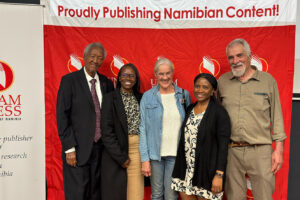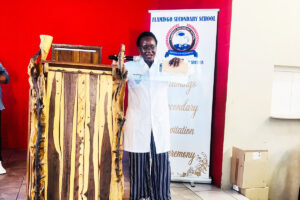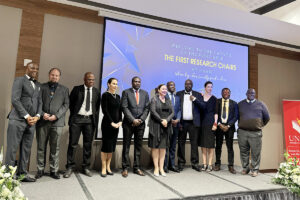School of Nursing expert demonstrates the practice of an Automated External Defibrillator (AED)
The heart is one of the most vital organs of our body. It’s the organ in the middle of our circulation system, pumping blood around the body as it beats. Yet, it could experience some heartbeat rhythm issues. That’s where quick access to an AED device comes in handy. In the first place, knowing how to use an AED device is essential.
This critical skill of operating an AED was recently imparted to staff members of the University of Namibia Primary Health Care (PHC) Clinic at the Main Campus by an expert in emergency rescue. Ms Justa de Klerk has over 20 years in the field of emergence care and joined the School of Nursing & Public Health 3 years ago.
When Mr Tangeni Velikoshi, the Assistant Director: Student Affairs, together with Clinic staff, were looking for an expert to train them on the usage of 2 AED devices in their position, the postgraduate lecturer in Critical Care Nursing, as well as Emergency Nursing, was just the right person.
“We had received 2 AED machines some time ago, but we were never ready to use them, as we simply didn’t know how to,” said Mr Velikoshi.
“Ms de Klerk’s expertise in the field showed on the day, with every Clinic staff now capable of potentially saving a life, should it depend on it, with an AED device.”
An AED is a medical device designed to analyse the heart rhythm and deliver an electric shock to victims of abnormal heartbeat (ventricular fibrillation) to restore the heart rhythm to normal. AEDs are important because they strengthen the chain of survival. They can restore a normal heart rhythm in victims of sudden cardiac arrest.
Ms de Klerk believes having to a certain degree knowledge of how to handle the device makes a big difference in a moment of need. “The device offers a quick automated life-saving emergency therapy and is operable by any layperson.
“The machines are fully automated, portable and can analyse the heart for shock rhythms. They are designed to give shocks automatically, and the rescuer does not press any button.”
Sister Laurencia Muinjo was one of the 3 staff members (and one student) that got training on the AED device. “In many instances, survival in victims of ventricular fibrillation and pulseless ventricular tachycardia (two shockable rhythms) has a higher outcome when healthcare providers or bystanders deliver prompt CPR.
“And more so, when defibrillation is attempted within 3 to 5 minutes of collapse. We stand ready now to help, should a situation arise on Campus.”
The University of Namibia Clinic at the Main Campus is a registered Primary Health Care centre, and as of 20 April 2022 it is a permanent COVID-19 vaccination point. Sister Muinjo is reachable at +264 61 206 4985, or by email: lmuinjo@unam.na
*Original story by: Etietop Akpabio.
Etietop is a 3rd-year media student, doing his internship in the Faculty of Health Sciences & Veterinary Medicine.





